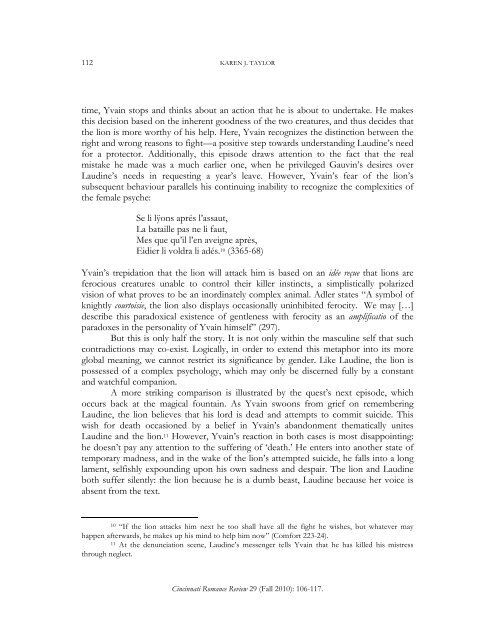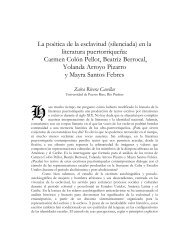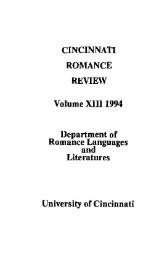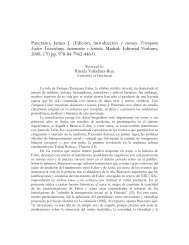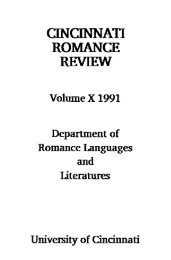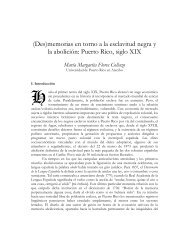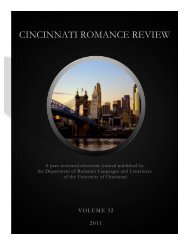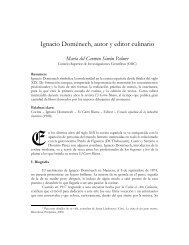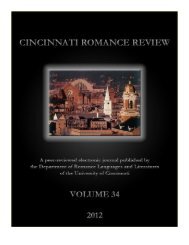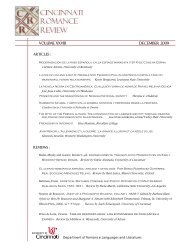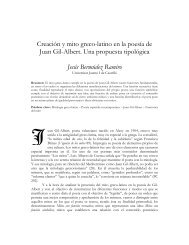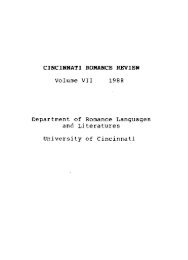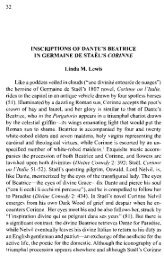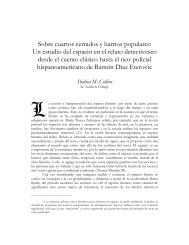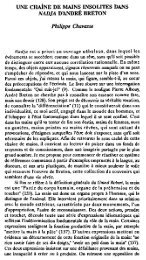Volume 29 - Cincinnati Romance Review
Volume 29 - Cincinnati Romance Review
Volume 29 - Cincinnati Romance Review
You also want an ePaper? Increase the reach of your titles
YUMPU automatically turns print PDFs into web optimized ePapers that Google loves.
112<br />
KAREN J. TAYLOR<br />
time, Yvain stops and thinks about an action that he is about to undertake. He makes<br />
this decision based on the inherent goodness of the two creatures, and thus decides that<br />
the lion is more worthy of his help. Here, Yvain recognizes the distinction between the<br />
right and wrong reasons to fight—a positive step towards understanding Laudine’s need<br />
for a protector. Additionally, this episode draws attention to the fact that the real<br />
mistake he made was a much earlier one, when he privileged Gauvin’s desires over<br />
Laudine’s needs in requesting a year’s leave. However, Yvain’s fear of the lion’s<br />
subsequent behaviour parallels his continuing inability to recognize the complexities of<br />
the female psyche:<br />
Se li lÿons aprés l’assaut,<br />
La bataille pas ne li faut,<br />
Mes que qu’il l’en aveigne après,<br />
Eidier li voldra li adés. 10 (3365-68)<br />
Yvain’s trepidation that the lion will attack him is based on an idée reçue that lions are<br />
ferocious creatures unable to control their killer instincts, a simplistically polarized<br />
vision of what proves to be an inordinately complex animal. Adler states “A symbol of<br />
knightly courtoisie, the lion also displays occasionally uninhibited ferocity. We may […]<br />
describe this paradoxical existence of gentleness with ferocity as an amplificatio of the<br />
paradoxes in the personality of Yvain himself” (<strong>29</strong>7).<br />
But this is only half the story. It is not only within the masculine self that such<br />
contradictions may co-exist. Logically, in order to extend this metaphor into its more<br />
global meaning, we cannot restrict its significance by gender. Like Laudine, the lion is<br />
possessed of a complex psychology, which may only be discerned fully by a constant<br />
and watchful companion.<br />
A more striking comparison is illustrated by the quest’s next episode, which<br />
occurs back at the magical fountain. As Yvain swoons from grief on remembering<br />
Laudine, the lion believes that his lord is dead and attempts to commit suicide. This<br />
wish for death occasioned by a belief in Yvain’s abandonment thematically unites<br />
Laudine and the lion. 11 However, Yvain’s reaction in both cases is most disappointing:<br />
he doesn’t pay any attention to the suffering of ‘death.’ He enters into another state of<br />
temporary madness, and in the wake of the lion’s attempted suicide, he falls into a long<br />
lament, selfishly expounding upon his own sadness and despair. The lion and Laudine<br />
both suffer silently: the lion because he is a dumb beast, Laudine because her voice is<br />
absent from the text.<br />
10 “If the lion attacks him next he too shall have all the fight he wishes, but whatever may<br />
happen afterwards, he makes up his mind to help him now” (Comfort 223-24).<br />
11 At the denunciation scene, Laudine’s messenger tells Yvain that he has killed his mistress<br />
through neglect.<br />
<strong>Cincinnati</strong> <strong>Romance</strong> <strong>Review</strong> <strong>29</strong> (Fall 2010): 106-117.


